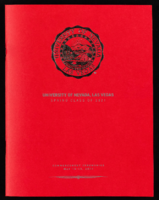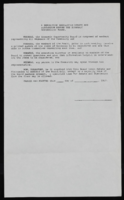Search the Special Collections and Archives Portal
Search Results
Maxine and Jack Cason oral history interview: transcript
Date
Archival Collection
Description
Oral history interview with Maxine and Jack Cason conducted by Claytee D. White and Stefani Evans on September 22, 1016 for the Building Las Vegas Oral History Project. In this interview, Jack discusses his early life in Oklahoma and arriving to Las Vegas, Nevada in 1950. He recalls the formation of Saveway Super Service, Philips 66 service stations, the competition in the fuel industry, and the opening of the first Rebel service station. Jack talks about fuel terminals, fuel bulk plants, and becoming one of the largest fuel providers in southern Nevada. Later, Maxine and Jack talk about supporting local sports organizations. Lastly, Jack discusses his involvement in the University of Nevada Las Vegas (UNLV) Athletics Department, and being inducted into the UNLV Sports Hall of Fame.
Text
Dina Neal (Nevada Legislature, Senator) oral history interview conducted by Magdalena Martinez and Makada Henry-Nickie: transcript
Date
Archival Collection
Description
From the Lincy Institute "Perspectives from the COVID-19 Pandemic" Oral History Project (MS-01178) -- Elected official interviews file.
Text

James Dean Leavitt oral history interviews: transcript
Date
Archival Collection
Description
Oral history interviews with James Dean Leavitt conducted by Claytee D. White on September 27 and October 4, 2022 for the Boyer Early Las Vegas Oral History Project. In this interview, Leavitt recalls his role in establishing a medical school at the University of Nevada, Las Vegas (UNLV), now known as Kirk Kerkorian School of Medicine. Leavitt was elected to the Board of Regents in 2004 while Jim Rogers was interim Chancellor of the Nevada System of Higher Education (NSHE), and he suggested the creation of an ad hoc committee Health Science Center Committee. In 2009, Leavitt became Chairman of the Board of Regents, Dan Klaich became Chancellor, and in the following year, Dr. Mark Doubrava joined the board. In May 2014, the planning dean was hired, Dr. Barbara Atkinson, and the UNLV School of Medicine was officially established on August 22, 2014.
Text

Nympha Comacchio oral history interview: transcript
Date
Archival Collection
Description
Oral history with Nympha Comacchio conducted by Cecilia Winchell and Stefani Evans on May 09, 2022 for the Reflections: the Las Vegas Asian American and Pacific Islander Oral History Project. In this interview, Comacchio recalls her childhood in the Philippines and growing up in a large family. After attending elementary school, Comacchio immediately went to work on her father's lumber farm, performing manual labor until she was seventeen. Later, she recalls finding employment as a seamstress in Manila, where she met her first husband when she left to work in Saudi Arabia for better pay. Comacchio describes how she was able to receive a student visa to finally immigrate to the United States, where she first arrived in California. Eventually, after meeting her second husband and hearing about housing prices in Las Vegas, Nevada, they purchased a house in the city in 2000. After briefly working for the New Frontier, Comacchio began working for the Wynn and Encore, where she found out about the Culinary Workers Union and became more active in that organization. Throughout the rest of the interview, Comacchio touches on the responsibilities of being a housekeeper, the current challenges they face, and how she feels about the growing AAPI population in southern Nevada.
Text
Lisa Levine (University of Nevada Regent) oral history interview conducted by Magdalena Martinez: transcript
Date
Archival Collection
Description
From the Lincy Institute "Perspectives from the COVID-19 Pandemic" Oral History Project (MS-01178) -- Elected official interviews file.
Text

University of Nevada, Las Vegas (UNLV) 38th commencement program
Date
Archival Collection
Description
Commencement program from University of Nevada, Las Vegas Commencement Programs and Graduation Lists (UA-00115).
Text
Taylour Tedder (Boulder City, City Manager) oral history interview conducted by Kelliann Beavers: transcript
Date
Archival Collection
Description
From the Lincy Institute "Perspectives from the COVID-19 Pandemic" Oral History Project (MS-01178) -- Government agency interviews file.
Text

University of Nevada, Las Vegas (UNLV) Spring 2021 commencement program
Date
Archival Collection
Description
Commencement program from University of Nevada, Las Vegas Commencement Programs and Graduation Lists (UA-00115).
Text

Economic Opportunity Board of Clark County (Nev.): memos, agendas, and meeting minutes
Date
Archival Collection
Description
From the Clark County Economic Opportunity Board Records -- Series I. Administrative. This folder contains memos, agendas and minutes from meetings of the Clark County Economic Opportunity Board from January 1967 through June 1967.
Text

Hernando Amaya oral history interview: transcript
Date
Archival Collection
Description
Oral history interview with Hernando Amaya conducted by Laurents Banuelos-Benitez, Marcela Rodriguez-Campo, and Barbara Tabach on October 18, 2018 and December 3, 2018 for the Latinx Voices of Southern Nevada Oral History Project. In this interview, Hernando Amaya talks about his childhood and education in Bogota, Colombia. He discusses his start in journalism as a young man and working for El Espectador, the Colombian national newspaper. He discusses his experiences reporting on the narco-terrorism occurring in Medellin, Colombia and how this eventually led to his immigration to the United States. Amaya moved to Las Vegas, Nevada in 2001 and continued his career in journalism by working for local Spanish speaking papers and websites. He relates his civic involvement in the Las Vegas area, his work as the president of the Colombian Association of Las Vegas, and various other civic engagements. As a journalist, he asserts the importance of knowing one's culture, storytelling, learning history, and being active in the community.
Text
